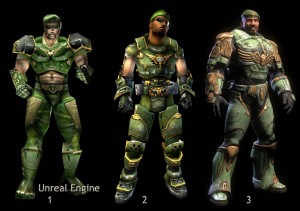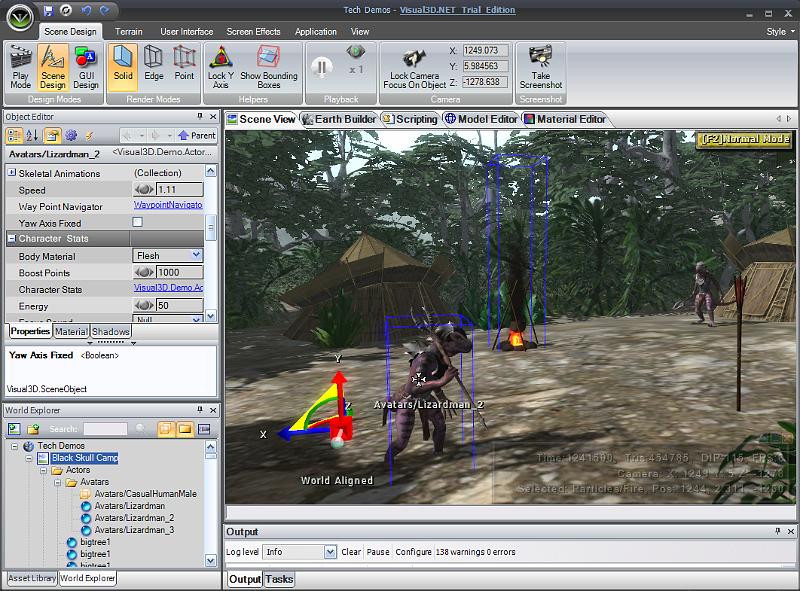Game Engine Primer
**Author’s note: This is a quick and easy view of a very complicated topic. If I decided to skip or not explain some aspect of game engines fully it is because of space constraints, not a malicious attempt to misinform the public**
With the recent announcement of the Unreal Engine 4 and all of the rumors and drama surrounding Unreal’s newest game engine, I figured I would provide a quick primer on game engines for those who don’t know what they are and why you should care about them.
 A game’s engine is an integral part of the game itself. It is the software that provides the graphical rendering, modeling, physics, and in some cases scripting, AI and networking as well. A good way to think about it is that it is the skeleton or framework for the video game. If a developer wants to use one of these engines, they will make a deal with the creator (usually by buying a license), such as Epic Games for Unreal or Valve for the Source Engine. Then they will be allowed to use the engine in their game. Now that the game developer has access to the engine, they use the tools available to create everything about their game, from models, environments, and actually programming the game.
A game’s engine is an integral part of the game itself. It is the software that provides the graphical rendering, modeling, physics, and in some cases scripting, AI and networking as well. A good way to think about it is that it is the skeleton or framework for the video game. If a developer wants to use one of these engines, they will make a deal with the creator (usually by buying a license), such as Epic Games for Unreal or Valve for the Source Engine. Then they will be allowed to use the engine in their game. Now that the game developer has access to the engine, they use the tools available to create everything about their game, from models, environments, and actually programming the game.
There are advantages and disadvantages to using a commercial game engine. It makes certain aspects of game development significantly easier, such as AI, scripting, in-game physics and console porting. Console porting is a huge piece of the puzzle for why people would use a game engine. Let’s say the game engine is supported on Console X and Y but not Z. If I begin making my game for Console X then later decide I want it to be cross platform, then it would be significantly easier for me to port the game to Console Y since the game engine supports that console and I wouldn’t have re-do large portions of my game.
The disadvantages are also clear, it is generally expensive to purchase a license for these engines, and each engine has their own strengths and weaknesses. That being said, many developers have used commercial engines to produce fabulous games such as XCOM : Enemy Unknown, Mass Effect 3, and Dishonored, and infamous ones like, Aliens: Colonial Marines, Hunted: Demon’s Forge, and the Turok reboot (oh, the squandered possibilities). In the end, using a game engine to produce your games makes things significantly easier.
 This brings us to the most important question of the article: Should you care about game engines? In short, Yes. In long, it depends on what consoles you do/don’t own but generally, Yes. Game engine support dictates which games get ported to which consoles. If a console creator didn’t support ANY third party game engines, then that console would have almost no cross platform games. In the modern market, the Xbox 360 and PS3 have very similar game engine support which is why you end up with lots of cross platform games between those consoles. Obviously, which consoles get which games is much more complicated than that, but this is just a quick overview of how game engines work, not Video Game industry politics.
This brings us to the most important question of the article: Should you care about game engines? In short, Yes. In long, it depends on what consoles you do/don’t own but generally, Yes. Game engine support dictates which games get ported to which consoles. If a console creator didn’t support ANY third party game engines, then that console would have almost no cross platform games. In the modern market, the Xbox 360 and PS3 have very similar game engine support which is why you end up with lots of cross platform games between those consoles. Obviously, which consoles get which games is much more complicated than that, but this is just a quick overview of how game engines work, not Video Game industry politics.
This is why there was drama surrounding the release of the Unreal Engine 4. If it did not have Wii U support it could potentially cut back on the amount of third party games being released for the Wii U. For this drama to make a little sense, here’s some quick history.

The Unreal Engine first debuted with the game Unreal in 1998. It was popular for its ease of use, especially when it came to modding. The Unreal 2 engine was released in 2002 with the game America’s Army, the United States military’s virtual recruitment tool which has since grown into a “real” game, surprisingly enough. The Unreal Engine 2 made huge graphical leaps, and was eventually updated to be supported by the Gamecube, Playstation 2 and (in 2011) the 3DS. The Unreal Engine 3 was created to natively support a large variety of platforms including Windows, OSX, Xbox 360, PS3, Wii U, PS Vita, and even the mobile platforms iOS and Android. This wide compatibility and ease of use has made it incredibly popular among modern game developers. The point of drama in this story is the as-yet unreleased Unreal Engine 4. Rumors circulated that it would not be built with Wii U support, even though Unreal 3 already supported the Wii U.
This lack of support would have been very startling and make no sense for Epic Games, but the rumors were untrue. The truth is that the Unreal Engine 4 will support the Wii U, so any game developers that want to make a Wii U game can use the Unreal Engine 4 when it is released.



April 9, 2013
I still prefer the Crytek Engine. Unreal just loves fancy light tricks lately.
April 9, 2013
NintendoPSX The Crytek Engine is beautiful, but not many game use it. I’m hopefully Unreal 4 will give us more than just fancy lens flares and particle effects.
April 9, 2013
ChristianMills NintendoPSX Well, Unreal is going to allow for streamlined rigging and such, thus making my job as a part-time game designer significantly easier because I won’t have to coordinate all these different job markets when considering the complexity of the game’s elements. More in my other comment.
April 9, 2013
SageWaterDragon ChristianMills NintendoPSX I love the Unreal engine. Tons of great games use it. What you are talking about is one of the major points of the article. Using a game engine makes thing significantly easier for the developers especially for porting.
April 9, 2013
I just hope that Wii U gets as much support as possible for next gen engines. I would hate to see many next gen games skipping a release on the Wii U because the graphics engines are not compatible. This seems to be the case with Battlefield 4 but we will see.
April 9, 2013
J Money With it’s compatibility with a lot of engines, it could happen. Then it comes down to the quality of the ports. I hope we don’t end up with piles of cheap, bad ports.
April 9, 2013
Firstly, let me explain what a game designer is. A game designer is one who, well, designs games. Easy enough, right? Wrong. People seem to have the impression that game design in the creation of a game from start to finish. No a game designer’s goals are to set standards and main concepts. For example, I have to figure out how a player would be able to get the maximum enjoyment out of set variables.
The reason I am explaining this is because there is a common misconception about Unreal 4. People believe that all U4 will be able to provide is pretty lens flare and nice particles. This is one of the features, but the main ability is to streamline game design. For example: I want to make players be able to do some extremely complicated feat in the aftergame, thus providing longevity. However, this is going to take complicated coding that our art team, which is done with their job at this point, can’t do. The rest of the team is working hard, and we have a deadline to make. With the assets we have already created, we can take elements of other sections, combine them, alter them, and set them in a separate section for the players to discover. And all this can be accomplished without hiring more staff.
I know the main article has already touched on the subject of ease, but they didn’t explain how game development itself could be altered in a fundamental way. Sure, you don’t have to spend time working on your engine, or being able to port things; that isn’t what I am talking about. I am talking about money, ease, and the effectiveness of letting developers make what they dream of.
Cheers,
SWD